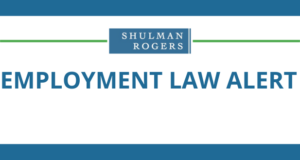
Corporate Transparency Act
With the arrival of spring and the first set of Corporate Transparency Act (CTA) filing deadlines behind us, it is a good time for an update on lessons learned from the initial filings.
As a reminder, the CTA was enacted by Congress to combat money laundering, fraud, and other illicit activities by increasing transparency in corporate ownership. Under the CTA, certain corporations, limited liability companies (LLCs), limited partnerships and other entities created by state law registration are now obligated to disclose information regarding their “beneficial owners” to the Treasury Department’s Financial Crimes Enforcement Network (FinCEN). For an in-depth understanding of the CTA, refer to our detailed client alert dated January 1, 2024.
With that high-level background, we offer these observations from the CTA trenches.
Increased Filing of Beneficial Ownership Information
Our January 2024 alert projected that more than 30 million companies would need to submit beneficial ownership information (BOI) reports in 2024 to comply with the CTA. The filing deadline for companies formed prior to January 1, 2024 is January 1, 2025, so there will be significant activity leading up to January 1, 2025.
Currently, the submissions primarily are from companies formed after January 1, 2024. During a March 13, 2024 CTA webinar hosted by LexisNexis, Jared Elostra from FinCEN revealed that approximately 940,000 BOI reports had been filed to date.
Companies are well-advised to consult with legal counsel as soon as possible to determine whether they are exempt from the CTA’s requirements or if they need to file a BOI report.
Service Providers Report Filing Backlogs
In the face of potential liability, many law firms are declining to file BOI reports on behalf of their clients. Companies are increasingly seeking BOI filing support from third-party service providers who traditionally handle document filing for business entities. Because FinCEN has not yet enabled a direct connection of the service company systems with FinCEN’s filing system, some service providers are reporting filing backlogs of two weeks or more as filing information has to be entered manually. Accordingly, companies that are required to file BOI reports should plan ahead and seek to file as early as possible.
Self-Application for FinCEN Identifiers
Entities and individuals applying for a FinCEN identifier, which simplifies amendments to BOI reports, must complete the application process themselves. Neither attorneys nor third-party entities can do this on behalf of a company, as the login information must align with the details provided for the FinCEN identifier.
No Current Option to Cancel FinCEN Identifiers
Once assigned, the FinCEN identifier cannot currently be canceled or terminated. This may lead to ongoing update requirements, even when the identifier is obsolete. FinCEN has been asked to address this quandary, but the timeline and certainty of any resolution are unclear.
Persistent Uncertainties in Some CTA Requirements
Identifying a reporting company’s “beneficial owners” under the CTA’s definition can be a very challenging task. An individual with “substantial control” over a company falls under this definition, yet the regulations lack clear-cut criteria for determining substantial control. As such, determining substantial control can be a highly fact-specific and subjective undertaking. Therefore, companies should seek legal counsel for precise evaluations regarding substantial control and beneficial ownership.
Additional ambiguity persists around whether subsidiaries of exempt entities qualify for exemption. The applicable CTA provisions look to control and ownership factors that have been subject to conflicting interpretations by lawyers and other commentators.
Physical Office Requirement for Filing BOI Reports
To comply with the CTA, companies must report their BOI and indicate a physical office address as their principal place of business in the United States. The use of post office boxes or registered agent addresses for this purpose is not permissible. The acceptability of a virtual office address remains uncertain, and while the use of a residential address seems viable and often the only address available given the trending shift to remote work, FinCEN has yet to provide explicit confirmation in this regard.
There have been requests to FinCEN to provide clarity on this requirement because many newly formed entities may not secure a physical office before their filing deadlines. This issue is expected to become more pressing in 2025 when the filing deadline will be shortened to 30 days post-formation.
There are already lawsuits challenging the CTA–and one court has held the CTA to be unconstitutional.
Legal challenges to the CTA have commenced, including a lawsuit filed in Alabama. In the case of National Small Business United v. Yellen, a federal court ruled on March 1, 2024 that the BOI reporting requirements are unconstitutional on the grounds that the CTA exceeds Congress’ power under the Constitution. This decision applies exclusively to the plaintiffs of the case, meaning other companies must still adhere to the CTA. The government has since appealed this ruling.
Watch for States Enacting Legislation Similar to the CTA
Finally, as if deciphering and complying with the CTA were not enough for businesses to deal with, some states are now passing CTA-like legislation of their own. For example, on March 1, 2024, New York Governor Kathy Hochul signed into law the amended LLC Transparency Act, which will go into effect on January 1, 2026 and will require limited liability companies formed or doing business in New York to file reports disclosing their beneficial ownership information. According to the National Association of Secretaries of State, other jurisdictions, including the District of Columbia, collect ownership and control information regarding businesses either through their articles of incorporation/organization or through periodic reports that businesses must file in their jurisdiction. Only time will tell if more jurisdictions will pass their own CTA-like legislation. Whether more jurisdictions decide to do so may depend on how the CTA fares as more legal challenges to the statute and regulations are resolved. Moving forward, we will continue to monitor these developments and provide updates on new legislative developments.
This is a summary of the laws and regulations in connection with the Corporate Transparency Act. This is a summary only and there are important details that may apply to an individual situation. Reference is made to the Act at 31 USC 53 Subch II Section 5336 and the regulations at 31 CFR Part 1010.380. You are strongly advised to read the law and regulations and consult with an attorney or other professional before filing or deciding not to file.
In addition, FinCEN has published a Small Entity Compliance Guide, FAQs and other information here.
* * * * * *
CONTACT
Aaron Ghais
Larry Bard
Marilyn Sonnie
MORE INFORMATION
The contents of this Alert are for informational purposes only and do not constitute legal advice. If you have any questions about this Alert, please contact the Shulman Rogers attorney with whom you regularly work or one of the attorneys listed above.
To receive future Client Advisories, Alerts, and other timely news and information from Shulman Rogers, please subscribe HERE.









